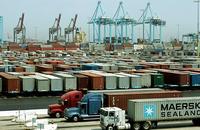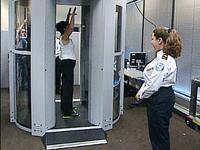-
Milwaukee studying Israel's homeland security practices
This week, Milwaukee County Sheriff David Clark along with about a dozen other police chiefs and county sheriffs are visiting Israel to study the country’s homeland security tactics; American law enforcement officials will learn more about Israeli practices in airport security, intelligence analysis and sharing, mass casualty management, and bomb disposal practices; the trip began on 10 April and will conclude on 16 April
-
-
Man smuggles 600 snakes, reptiles on bus
Acting on tip-off, police in Argentina searched the luggage of a bus passenger traveling from Santiago del Estero to Buenos Aires; the luggage contained 444 boas, vipers, and other snakes; 186 endangered tortoises; 40 lizards, and an armadillo
-
-
Sector Report for Thursday, 31 March 2011: Transportation Security
This report contains the following stories.
Plus 1 additional story.
-
-
Full-body scanners not a health risk
A new study concludes that there is “no significant threat” from backscatter X-ray scanners; even though they use ionizing radiation, which is known to cause cancer, the doses are so low — less than 1 percent of the additional radiation a person gets from flying in an airplane in the first place, and about the same received through 3 to 9 minutes of daily life on the ground — that only a handful of cancer cases are likely to result directly from scanner use
-
-
TSA testing a scanner that does not show a person's body
TSA is testing a new Automatic Target Recognition machine that does not show a person’s body but, rather, a genderless avatar — sort of a cartoon of a generic human figure; the machine scans the traveler without anyone seeing an image; if the traveler gets a green light, he or she proceeds; if the machine sees something, it will light up the area on this genderless figure and it will be that area that is examined; the pat down will be limited to the area the machine flagged
-
-
Shortage of funds hampers Russia's rail security
Railroads in Russia are proving to be a far greater security challenge than airports; there are 18,000 train stations in Russia; the railroad operators have money to place passenger and luggage inspection facilities, radio jamming devices, and explosion-proof containers in 34 of these stations; train stations are not the only points where railroads are vulnerable to terrorist attack; a bomb can easily be planted anywhere along a train’s route; in 2010 alone, 542 instances of “objects placed on rails” were reported, as well as 101 cases of rail sabotage; some suggested fencing off the entire length of Russia’s railroad tracks — but since railroads in Russia stretch for over 82,000 kilometers, it was calculated that the funding needed for this comprehensive measure would be 13 trillion rubles; for comparison, the entire 2011 budget of the Russian Federation stands at 8.8 trillion rubles
-
-
TSA fired an agent for being a witch
TSA fires a security screener at New York’s Albany International Airport for being a witch; the screener, who practices Wicca, was accused by a fellow worker of casting a spell on her (the fellow worker’s) car’s heater so it would not work; when the screener refused to participate in mediation to dispel myths about Wicca, she was terminated
-
-
Detecting critical flaws in railroad lines
Rails are the only thing keeping trains weighing thousands of tons travelling anywhere from 70 to 160 miles per hour grounded, thus any flaws or imperfections in these rails could result in accidents or major delays; railroads transport more than 25 percent of the goods in the United States including critical resources like coal, lumber, chemicals, and grain; one firm has developed the technology to detect flaws in rails that could cause major disruptions or delays; most flaws occur inside the rail and cannot be seen with the naked eye
-
-
TSA looking for shoe scanning devices
DHS is seeking companies to which it will award a contract for shoe scanners; according to the Office of Federal Business Opportunities, the Shoe Scanning Device (SSD) system currently sought by the TSA and DHS “will be capable of detecting threat objects concealed in footwear without requiring passengers to remove their footwear as they pass through a security checkpoint. These threat objects include a wide variety of military, commercial, and homemade explosives or explosives devices”
-
-
Authors suggest ways to alleviate L.A. cargo port "constipation"

In January, the port of Los Angeles received more than 330,000 containers; the possibility that one of those 330,000 containers could have contained a dirty bomb, or worse, keeps security experts up at night; experts say that to ensure security and prevent logjams, the best approach to container security would be to replace the current system, which singles out only those containers whose documentation raises questions, with a system which will see terminal operators X-ray every container, regardless of its eventual destination; only those containers flagged during the low-level scan would be subjected to a more thorough search
-
-
TSA considering "identity-based" screening
TSA does not call it “profiling,” but “identity-based screening”; the department is asking for public comments on the proposed system; “Physical screening will likely never go away completely, but the idea of adding identity-based security makes good sense and it’s an idea we’re actively exploring,” the department says
-
-
The color of truth is always gray
Those who object to thorough security checks at airports have every right to hold on to their belief that TSA employs methods are too intrusive, but the majority of travelers prefer greater safety even if achieving it may compromise some people’s notions of privacy. We should recall the era when smoking was permitted on planes: you could choose to sit in either the “smoking” or “non-smoking” seats; trouble was, a plane is a closed tube, so within minutes of take-off, everybody on board was engulfed in cigarette smoke, whether or not he or she was a smoker. By the late 1980s the airlines, with government encouragement, banned smoking on planes. The reason: smokers have rights, but they have no right to turn non-smokers into second-hand smokers and thus heighten non-smokers’ risk of dying of lung cancer. There is a lesson here for the debate over privacy and security at airports: we should assume that some people feel strongly that their privacy and dignity are being compromised by full-body scanning. We should respect their views. But they have no right to ask the rest of us to take greater risks with our lives because of their strongly held views with regard to privacy.
-
-
Sector Report for Thursday, 17 March 2011: Transportation Security
This report contains the following stories.
Plus 2 additional stories
-
-
TSA retests body scanners amidst radiation exposure concerns

The Transportation Security Administration (TSA) recently announced that it was retesting all of its full-body scanners over concerns that they were emitting high levels of radiation; maintenance records have shown that some scanners emitted radiation levels ten times higher than expected; TSA says that these increased levels were simply the result of a math mistake and that the machines do not pose a health risk; one type of body scanner in use relies on backscatter X-rays which produce very low levels of ionizing radiation; experts worry about the long-term effects of repeated exposure at low levels
-
-
Battle over private airport security screeners rages on
Republican lawmakers launched a fresh set of attacks against the Transportation Security Administration (TSA) in the continuing dispute over the private security screener program; Representative John Mica accused the TSA of inflating cost estimates of the private security screener program in an attempt to end it; the charges come after a new Government Accountability Office (GAO) report was released that found private security screeners would cost just 3 percent more; in 2007 TSA published a study that found using private screeners would cost 17 percent more
-
More headlines
The long view
New Technology is Keeping the Skies Safe
DHS S&T Baggage, Cargo, and People Screening (BCP) Program develops state-of-the-art screening solutions to help secure airspace, communities, and borders
